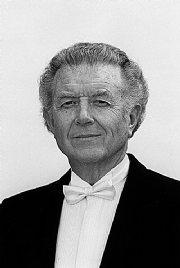Popular Artists on this website
Major Peter Parkes
Major Peter Parkes is widely considered to have been the most successful postwar brass band conductor. During his 35-year banding career he won more than 50 major contests, including the treble of the National Championships, British Open and European Championships on two occasions, a feat no other conductor has achieved.He had a distinguished musical career in the Army, first as Director of Music of the Royal Engineers and as Director of Music of the Grenadier Guards, before becoming “professional conductor” of the Black Dyke Mills Band during his 14-year tenure. He did much to bring the West Yorkshire brass band, which was founded in 1855, to international attention; it won the British Nationals on six occasions.
Peter William Parkes was born in Northampton in 1928 to Kate and Leonard Parkes, who owned a fishmonger’s shop in the town. He was their eldest surviving child; a sister, Jean, had died in infancy. His parents had a further five children. Music was a private passion for him and he enjoyed learning the violin. His violin teacher astutely noted that as Parkes would be called up for National Service at 18, it might be prudent to learn a wind instrument and apply to join an army band when the time came. Parkes obtained a clarinet and made such quick progress that he was soon able to join the town wind band.In 1951 Parkes returned to Kneller Hall as a student bandmaster. He passed his exams with distinction and in 1954 was made bandmaster of the Duke of Cornwall’s Light Infantry — it is believed that at the time he was the youngest army bandmaster — with the rank of Warrant Officer, Class One.
His army career proceeded apace and by 1965 he was Director of Music of the Royal Engineers; in 1966 he was made Director of Music of the Grenadier Guards, for which he undertook all the ceremonial duties associated with the role, including Trooping the Colour, He also composed several marches for the Grenadiers, including The White Plume (1975), which he wrote for Trooping the Colour.
Parkes first conducted the Black Dyke Mills Band (since renamed the Black Dyke Band) in 1975 in what was originally intended to be a single performance in the finals of the national championships. His success with the band, based in Queensbury, West Yorkshire, began immediately as he led them to victory in the contest, playing Robert Farnon’s Une Vie de Matelot. Parkes then became the band’s professional conductor, a position he would hold for the next 14 years.His inspirational conducting and unique interpretation of the music helped make Black Dyke an unstoppable force, and the band led by the conductor affectionately known as “the Major” achieved victories at the British Open Championships, British National Championships and the European Championships. Over the next 14 years Parkes led the band to win another 17 leading titles. They won the nationals six times, including a hat-trick between 1975 and 1977, the British Open on five occasions, two successive “doubles” (winning the Open and nationals in the same year) and seven victories in the European Championships — four of which were in succession.The year 1985 remains Black Dyke’s most successful year, in which, under Parkes’s leadership, they won all five of the banding world’s major contests. They began in January by winning the BBC Band of the Year and followed this success in February by becoming Champions of Yorkshire. May saw them achieve victory at the European Championships in Copenhagen and they completed the year by winning the British Open in September and the National Championships in October.
It was during his time with Black Dyke that another long and fruitful relationship was formed with the Whitburn Band, winning several Scottish championships. After leaving Black Dyke in 1989, Parkes became principal conductor of the William Fairey Band, with whom he enjoyed further success. In 1993 he led the band to victory at the British Open and National Championships, and completed the treble in 1994 when they won the European Championships.
Throughout his career Parkes travelled the world as conductor and contest adjudicator, and directed brass and military bands in the recording of more than 100 commercial albums. He never retired from his musical career and was working right up until his death. He was president of the British Federation of Brass Bands, chairman of the Brass Band Heritage Trust, vice-president of the National Association of Brass Band Conductors, a founder member of the Association of Brass Band Adjudicators and a member of the Council of the National Youth Brass Band of Great Britain.
Major Peter Parkes, brass band conductor, was born on May 8, 1928. He died on February 12, 2011, aged 82














 My Wish List
My Wish List














